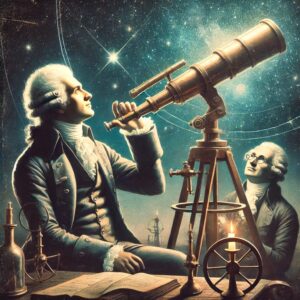On the night of March 13, 1781, German-born astronomer William Herschel made a discovery that would forever change humanity’s understanding of the solar system. With his homemade telescope, Herschel spotted an object that appeared to be a comet, but after further observations, he realized it was something far more significant—a new planet. This celestial body, later named Uranus, became the first planet discovered with a telescope, expanding the known boundaries of the solar system for the first time in recorded history.
Before Herschel’s discovery, the solar system was thought to end with Saturn. For millennia, ancient astronomers had mapped the five visible planets—Mercury, Venus, Mars, Jupiter, and Saturn—believing the universe to be a fixed and unchanging entity. Herschel’s groundbreaking find shattered this assumption, proving that the cosmos held more secrets yet to be uncovered. At first, he believed the object might be a comet, but as astronomers across Europe studied its slow, steady orbit, they confirmed that it was, in fact, a new planet—the first discovered since antiquity.
Naming the new planet was a matter of debate. Herschel initially proposed “Georgium Sidus” in honor of King George III, but the scientific community ultimately settled on Uranus, following the tradition of naming planets after mythological deities. Uranus, the Greek god of the sky, was a fitting name for this distant and mysterious world. Unlike the other planets, Uranus rotates on its side, giving it one of the most unusual axial tilts in the solar system. This strange behavior only added to the intrigue surrounding Herschel’s monumental find.
Herschel’s discovery was more than just a new dot in the night sky—it was a turning point in astronomy. It proved that the universe was far more vast and dynamic than previously believed. His work inspired generations of astronomers to search beyond the visible, leading to future discoveries of Neptune, Pluto, and countless celestial wonders. Uranus may not be the most famous planet in our solar system, but its discovery opened a new era of space exploration and deepened our curiosity about what lies beyond.
More than two centuries later, William Herschel’s legacy endures. His discovery of Uranus reminds us that the universe is full of surprises, and with patience, curiosity, and the right tools, there’s always more to uncover.

